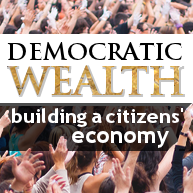Search Result for “state of nature”

Liberty, Liberalism and Surveillance: a Q&A with Quentin Skinner
One of England’s most distinguished scholars, Quentin Skinner is a leading historian of political thought and an outstanding advocate of a contemporary republican viewpoint. This interview with Richard Marshall of 3:AM sets out an accessible overview of a lifetime of work. We are grateful to 3:AM for letting us republish it as part of Politics and Spires’ Democractic Wealth series. Open Democracy, our series partner, added at the end two additional questions about corporate power, surveillance and freedom. Skinner’s answer with respect to surveillance is a strong, clear statement of how it is a threat to liberty. This is especially relevant to current affairs given the superficiality of official and in particular British media responses to the Snowden revelations published by the Guardian’s Glenn Greenwald about the programmes of total surveillance being attempted by US and UK secret services.
RM: You are known as a leading historian of political history and in particular the formation of ideas around human liberty. One of the key ideas you’ve written about is what you label ‘neo-Roman’ liberty’. This began back in Ancient Rome didn’t it, where freedom was contrasted with slavery, wasn’t it? Can you tell us what its distinctive traits are?
QS: The vision of personal freedom that interests me is articulated most clearly in the Digest of Roman Law, which is why I have wanted to describe its later manifestations as examples of ‘neo-Roman’ liberty. The fundamental distinction drawn at the outset of the Digest is between the liber homo, the free person, and the servus or slave. The law needed to begin with this contrast because law applies only to free persons, not to slaves. So one crucial question was: what makes a slave? The answer given in the legal texts is that a slave is someone who is in potestate, in the power of a master. The contrast is with someone who is sui iuris, able to act in their own right. Long before these argument were summarised in the legal texts, they had been elaborated by a number of Roman moralists and historians, above all Sallust, Livy and Tacitus. These writers were interested in the broader question of what it means to say of individuals – or even of whole bodies of people – that they have been made to live in the manner of slaves. The answer they give is that, if you are subject to the arbitrary will of anyone else, such that you are dependent on their mere goodwill, then you may be said to be living in servitude, however elevated may be your position in society. So, for example, Tacitus speaks of the servitude of the entire senatorial class under the Emperor Tiberius, so wholly subject were they to his lethal caprice.

A democratic case for the free market?
Democracy is morally prior to the economy. The structure of the economy is something a sovereign people may and should design and redesign to secure its common good – that is, the shared interest of each and every citizen in life, liberty and economic opportunity. This is the basic premise of the ‘Democratic Wealth’ series that I have the pleasure of editing. This is, however, by no means an uncontroversial premise.

Should America Care About Energy Independence?
For the past forty years, the United States has been dependent on foreign oil. In the early 1970s, declining domestic production and America’s ever increasing thirst for oil made dependency on imports a necessity, whilst the OPEC Revolution and the 1973 Arab oil embargo seemed to also make dependency a serious threat to national security. Beginning with the formulation of Nixon’s “Project Independence”, the US has sought to reverse this worrisome position and restore what is usually imagined as a quasi-paradisiacal state of nature: energy independence. Yet, while president after president emphasised the importance of tackling the problem, US net oil imports kept rising, until they peaked in 2005 at about 12.5 million barrels of oil per day, 65% of …

Assessing the Performance of Minority Governments in Europe: The Devil is in the Detail
In 1974, when Harold Wilson formed the UK’s first minority government in 45 years, observers like Anthony King optimistically claimed that “[m]inority rule can work”. This challenges the oft-cited view of Strøm that minority governments are “counterintuitive phenomen[a] in the world of parliamentary democracy”. Today, minority governments constitute approximately one third of governments in established parliamentary democracies, globally. This ‘counterintuitive’ statistic raises the following questions: When can minority rule work? Under which conditions are minority cabinets effective? How have minority rule governments evolved over time? To answer these questions, I focus on three cases – Sweden, Norway, and Denmark – where minority cabinets are the predominant form of government. Ultimately, I argue that existing measures to assess the performance of …

Populism and Crisis: Exploring the Interplay of Political Dynamics
Over the past two decades, the world has faced a series of crises including economic downturns, political disruptions exemplified by events such as the latest example of the Covid-19 pandemic, which have generated a discourse around a perceived crisis in democratic governance. Due to its perceived association with these crises, populism has become a focal point of both academic inquiry and broader societal discourse, with a strong emphasis on its relationship with democracy (Mény & Surel, 2002). Scholarly investigations into populism have expanded to encompass various dimensions, including its conceptual underpinnings and implications for democratic systems. The existing literature on populism underscores its delineation along two main axes: the assertion of popular sovereignty and the espousal of anti-establishment sentiments. Despite …

King in his own chess game: Orbán, the Hungarian “special path” and international ambitions
It was a matter of “religious freedom” – following a request from Serbia, Hungary’s veto on the sanctioning of Patriarch Kirill would have been expected. It was one of the interesting takeaways from of a few days spent in the company of pro-Fidesz politicians, pastors, and public intellectuals at the Tusványos summer festival. Gathered in the heart of Romania – home to a sizeable minority of ethnic Hungarians, about 6 per cent of the population – it struck me that Orbán’s story is not just a story of Hungary. It is a story of the region, of Europe, and of Hungary’s place in the world. A new story about Hungary When Orbán came to power for the second time in …

Review of Defekte Visionen. Eine Intervention zur Zukunft der Europäischen Union (Broken Visions. An Intervention on the Future of the European Union) by Alexander Thiele
What does the future of the European Union (EU) look like? Walking along the Rue de la Loi in the European Quarter in Brussels, the white and blue mural stating “The Future is Europe” by graffiti artist NovaDead sends a clear message. The bird in the right-hand corner stands for freedom and peace (referring to the values in Art. 2 of the Treaty on EU), the blue and yellow colours refer to the European flag, and the leaves recall the “green jungle” (a small forest of philodendrons) at the European Parliament in Strasbourg, which could also reflect the complex governance structure of the EU. But beyond this artistic and symbolic vision, what might the future of the EU look like …

Policing of the Far-Right Online: The cases of the UK and Hungary
A Dialogic Turn in Online Far-Right Activism Far-right groups, which encompass a broad plethora of cognate paramilitary groups, political parties and protest movements with nativist, authoritarian and populist policy platforms (Mudde 2007; Carter 2018), have increasingly been able to mobilise, exploit, and weaponise the online space for activism and their campaigns. Recent research suggests that such groups have been able to exercise an ‘opportunistic pragmatism’ when using online platforms, creating new hubs of convergence and influencing elections in countries like Germany, Italy and Sweden (Davey & Ebner 2017 & 2018; Colliver et al 2018). Just as examples of recent far-right successes in the electoral arena now abound, such cases also demonstrate a shift away from parochial concerns in using the …









